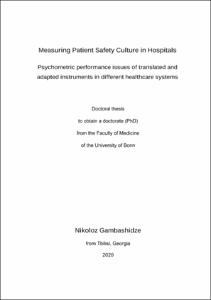Measuring Patient Safety Culture in HospitalsPsychometric performance issues of translated and adapted instruments in different healthcare systems

Measuring Patient Safety Culture in Hospitals
Psychometric performance issues of translated and adapted instruments in different healthcare systems

| dc.contributor.advisor | Manser, Tanja | |
| dc.contributor.author | Gambashidze, Nikoloz | |
| dc.date.accessioned | 2020-10-13T10:36:54Z | |
| dc.date.available | 2020-10-13T10:36:54Z | |
| dc.date.issued | 13.10.2020 | |
| dc.identifier.uri | https://hdl.handle.net/20.500.11811/8661 | |
| dc.description.abstract | In order to enable continuous improvements in patient safety, establishing patient safety culture (PSC) has been recommended, which supports open communication, and a blame-free environment for individual and organizational learning. In order to establish and promote a positive patient safety culture, hospital managers need to measure it systematically with valid instruments, a number of which have been developed and implemented worldwide. Despite an increasing number of validation studies using different language versions, it is still not clear, to what extend do these instruments perform differently in new environments and to what extent can the results of these studies be compared. The core dimensions of PSC are also not clear, those that are stable across various instruments and various healthcare systems.
In order to facilitate better conceptualization of PSC, to further the development of PSC instruments, and to support the comparability of results across different healthcare systems, this thesis aimed to study various measurement issues associated with the use of translated and adapted versions of established instruments for measuring patient safety culture in hospitals. The data from German, Swiss and Georgian hospitals were used to evaluate the psychometric properties of two PSC instruments, to reveal the PSC dimensions they measure, as well as to study the effects of various instrument- and sample related factors on the psychometric performance of these instruments and on survey results. Four studies were included in this work. Three validation studies using data from German and Georgian hospitals showed that dimensionality of the instruments may vary between different language versions and/or healthcare systems. The fourth study demonstrated a significant effect of participant characteristics such as profession and managerial functions on study results. Interestingly, these effects were found to vary across healthcare systems. Additionally an effect of reverse item bias on the psychometric properties, as well as on the survey results was demonstrated. Overall, the results of the four studies included in this thesis show that currently available instruments, although useful for studying patient safety culture locally, may not be valid for international comparative studies. Moreover, as the performance and the outcome of these instruments may depend on characteristics of the healthcare system, the sample and the participants, interpretation and comparison of results across studies should be made with extreme caution. | en |
| dc.language.iso | eng | |
| dc.rights | In Copyright | |
| dc.rights.uri | http://rightsstatements.org/vocab/InC/1.0/ | |
| dc.subject | Kultur der Patientensicherheit | |
| dc.subject | Messinstrumente | |
| dc.subject | Fragebögen | |
| dc.subject | Psychometrische Eigenschaften | |
| dc.subject | Krankenhaus Umfrage | |
| dc.subject | Mitarbeiterbefragung | |
| dc.subject | Länderübergreifender Vergleich | |
| dc.subject | Patient Safety Culture | |
| dc.subject | Measurement instruments | |
| dc.subject | Questionnaires | |
| dc.subject | Hospital survey | |
| dc.subject | Employee survey | |
| dc.subject | Psychometric properties | |
| dc.subject | Cross-national comparison | |
| dc.subject.ddc | 610 Medizin, Gesundheit | |
| dc.title | Measuring Patient Safety Culture in Hospitals | |
| dc.title.alternative | Psychometric performance issues of translated and adapted instruments in different healthcare systems | |
| dc.type | Dissertation oder Habilitation | |
| dc.publisher.name | Universitäts- und Landesbibliothek Bonn | |
| dc.publisher.location | Bonn | |
| dc.rights.accessRights | openAccess | |
| dc.identifier.urn | https://nbn-resolving.org/urn:nbn:de:hbz:5-59960 | |
| ulbbn.pubtype | Erstveröffentlichung | |
| ulbbnediss.affiliation.name | Rheinische Friedrich-Wilhelms-Universität Bonn | |
| ulbbnediss.affiliation.location | Bonn | |
| ulbbnediss.thesis.level | Dissertation | |
| ulbbnediss.dissID | 5996 | |
| ulbbnediss.date.accepted | 21.08.2020 | |
| ulbbnediss.institute | Medizinische Fakultät / Institute : Institut für Patientensicherheit (IfPS) | |
| ulbbnediss.fakultaet | Medizinische Fakultät | |
| dc.contributor.coReferee | Schwappach, David |
Dateien zu dieser Ressource
Das Dokument erscheint in:
-
E-Dissertationen (1616)




